Licensed To Kill?
Gaming licenses
These days more and more games seem to be based on established "licenses", such as movies, novels, or comic books.
Of course, the idea of the "game of the movie" has been around for a long time - one of the first was a terrible computer game based on ET, way back in the early 1980's. And generally they haven't gotten any better with time - anybody remember "Men In Black", or "Star Wars : Phantom Menace"?
But now gaming licenses seem to be having something of a resurgence, and this time the games are actually looking interesting in their own right. So what is behind this trend, and what do the licenses offer to developers, publishers, and gamers?
Games like FAKK 2 (based on an animated movie), KISS : Psycho Circus (based on a comic, itself based on a heavy metal band) and Star Trek : Elite Force (based on a TV series) are amongst those leading the way, and we spoke to the developers of these and other games to find out more...
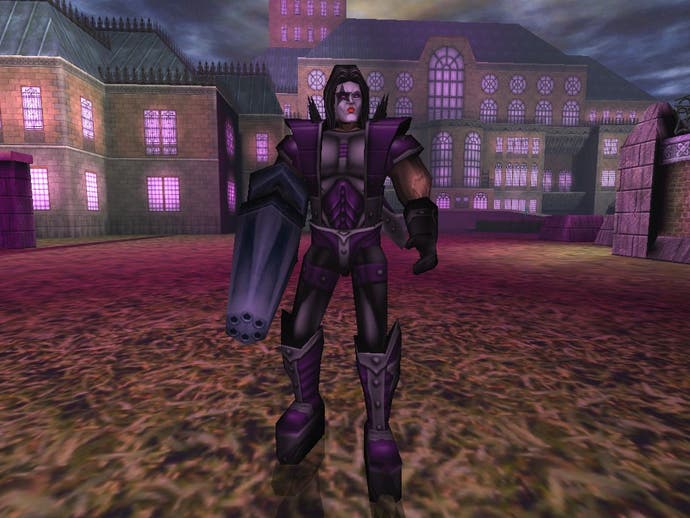
KISSed By GOD
Perhaps the most obvious benefit of building a game based on an established license is that it gives you a background setting, and maybe even characters and a plot, on which to base your game.
Mark Morgan is a "Digital Artisan" at Third Law Interactive, who are currently working on a game based on the KISS : Psycho Circus comics created by Todd McFarlane of Spawn fame. According to Mark, working with the Psycho Circus license gives them "a great base universe established in the comics, as well as a story and imposing imagery".
This acts as a base and background for the game, which gives it a more solid feel. After all, Todd McFarlane and his company have been working for years on creating a lavishly detailed world and characters for the comics, a luxury that few developers can afford.
This isn't just an excuse for developers to be lazy though, and Third Law have added their own touch to the game rather than just taking all their ideas from the comics.
"We have tried our best to make Psycho Circus as if it were our own original concept", Mark Morgan explained. "In truth, granted the freedom we've had in design and development of the title, it damn near is."
Will Loconto, Third Law's audio designer, elaborates. "Contrary to what people might think about a licensed product, we actually have a lot of freedom in designing this game."
"Both KISS and Todd McFarlane Productions have rights of refusal if we do something they don't like, but so far they have taken a very hands-off approach. While there will be a number of characters that come from the comics, most of the creatures in the game are our own."
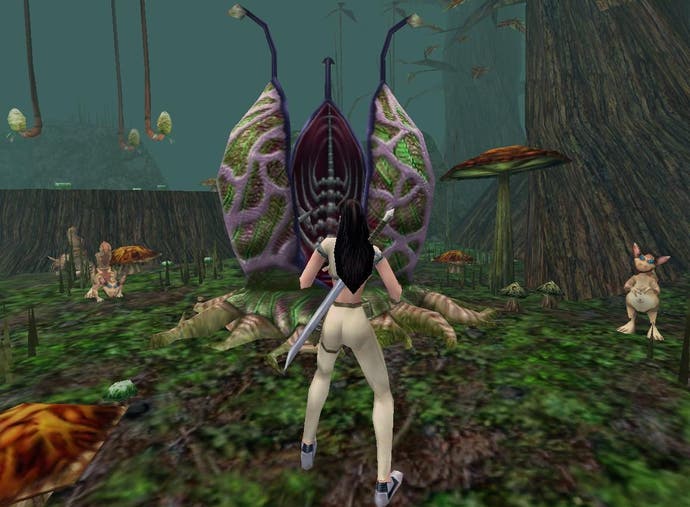
FAKK Me
Ritual are taking a similar approach with their current project, a third person action adventure game based on the forthcoming animated movie "Heavy Metal : FAKK 2".
Instead of just making a "game of the movie", Ritual are using the license as a backdrop for their game. Although some of the game's characters are taken from the movie, the game's story and settings are mostly Ritual's own creation.
The key, as Tom Mustaine told me in a recent interview, is that "the sheer volume of vivid creative content that exists within the Heavy Metal universe helps to spawn great game ideas".
"Kevin [Eastman - director of the FAKK 2 movie] was really behind us creating our own content for the game, [while] giving Ritual the opportunity to use any assets from the movie or the Heavy Metal universe."
This freedom has meant that although Ritual have been inspired by the comics and movie, and the game will no doubt be instantly familiar to Heavy Metal fans, they haven't been constrained to simply retelling the movie's story in digital form.
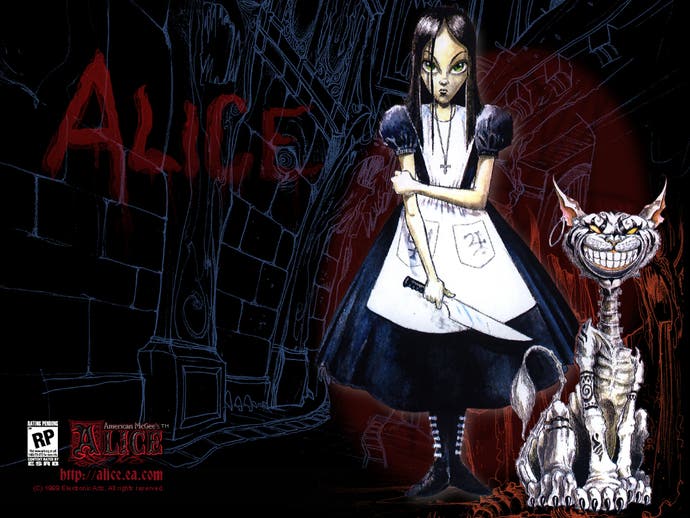
The Automated Alice
Freedom is also important to American McGee, formerly a level designer at id Software, and now working on his own game with Rogue Entertainment and Electronic Arts.
One of the more unusual games currently in development, American's new project is a third person adventure game based on the story of "Alice In Wonderland"!
"Alice actually offers quite a lot of freedom both in game design and artistic design", American told us. "It's a story that most people are already familiar with, so we don't have to worry about selling the characters and locations. And the world of Wonderland is great for exploring new types of gameplay mechanics and interactions."
This was the reason behind American choosing to design a game based around Alice, as he explained. "To be honest, I was getting really tired of doing the same 'get the gun, kill the monster, escape from the alien whatever' game over and over."
"Alice is a fresh break from what has come before, and it excited me that we might be able to expand the types of stories we tell with these game engines."
Strictly speaking though, "American McGee's Alice" is not based on a licensed property, as "there is no 'Alice license'". The original Alice novels were written way back in the 1860s, and their author Lewis Carroll is long since dead.
The story is now public domain, and this means that American can develop the game without worrying about Lewis Carroll or his estate demanding a license fee, or complaining about the way he is portraying the character of Alice and the world of Wonderland.

Reinventing The Wheel
Another game based on a novel (or rather a series of novels) is Legend's recently released Wheel Of Time, based on the popular epic fantasy series of the same name by author Robert Jordan.
Glen Dahlgren, the game's producer, told us that the big advantage of building a game based around the Wheel Of Time license is that it "offers a ready-made world, already developed, with a ton of description and raw material to draw upon".
Almost literally a ton actually, as the series now spans seven hefty tomes. This makes the Wheel Of Time license more limiting than say the Heavy Metal license, as Robert Jordan has defined the world in great detail, and any game must conform not only to the novels, but also to the extensive background history of a world that stretches back for hundreds of years before the first novel starts!
"Naturally, the game is limited by the rules set by the license - I can't create stuff that doesn't make sense inside of the established world".
But overall the experience seems to have been a positive one. "I was a fan of the books (as were many of the other developers), so it was fun to play inside of Jordan's world", Glen said. "[And] his renowned detail helped in the art direction process."
Having a detailed world pre-developed wasn't the only advantage that the Wheel Of Time license brought to the game though. "Licenses bring an established audience to the table, fans who will more than likely buy the game because it is based on something they have already enjoyed."
This is the other main advantage of basing a game on an established license, particularly one with as large a fanbase as the Wheel Of Time series. But it can be a double-edged sword, as you are constantly under the spotlight from the license's fans.
"Fans usually already have preconceived notions of what the 'perfect' game inside the licensed world should be like. I frequently got mail from people who honestly felt that they spoke for the author in telling me that I was destroying the license."
The other problem is that "people who are not familiar with the license might feel that they are left out, that the game is not intended for them. I tried hard to make people feel like they didn't have to read any of Jordan's 1000+ page tomes in order to enjoy the game".
Wheel Of Time isn't Legend's first game based on a license either. "All of my games have been licensed - Gateway, Gateway II, Death Gate, and now the Wheel Of Time. I'm actually really looking forward to working on a non-licensed product."
He may have wait a little though, as Legend's next big project is a license of a different kind - Epic Games have entrusted them with developing a sequel to their hit first person shooter, Unreal!
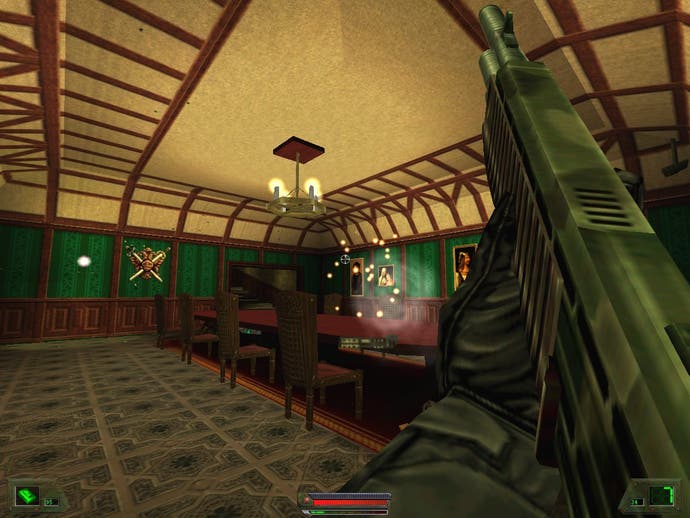
Mercenary
Raven are no strangers to licenses either - both of their current projects are based on established licenses.
The first is Soldier Of Fortune, in which you play a mercenary carrying out a series of dangerous missions in a pseudo-realistic world.
"Raven wanted to make a military action game based in the real world in the present day. Activision approached us about using the name Soldier of Fortune with the game, and we loved the idea", Kenn Hoekstra told us.
"Soldier of Fortune is a household name. Anyone who sees the title on the shelves is going to know instantly, even without picking it up, that it's a military combat action game."
The game's title comes from a magazine - not very well known outside of America perhaps, but certainly a big draw for gun fetishists everywhere. "The name conjures up the imagery of exactly what we were trying to do with the game, and it added a lot to the depth of the game world."
As well as reading the magazines, Raven have consulted a real-life mercenary to ensure that their game is as realistic as possible. Weapon effects are accurately modelled, and shooting somebody results in an appropriately gory and wince-inducing death animation.
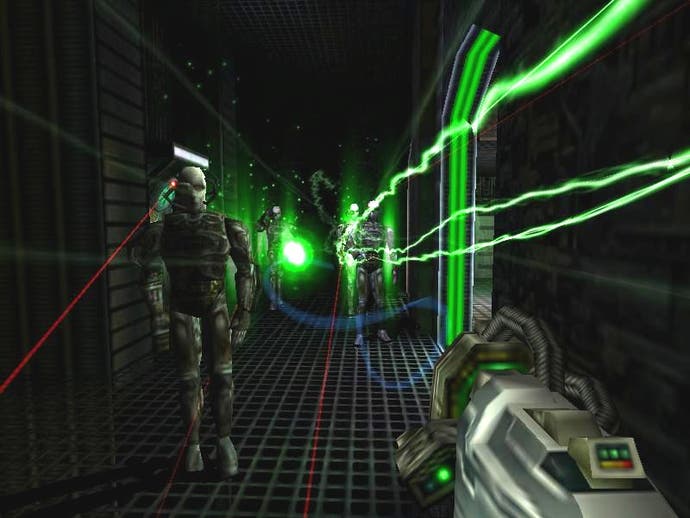
Phasers To Stun
Raven's second project is Elite Force, based on the TV series "Star Trek : Voyager", and the Star Trek license is at once the most desirable and the most awkward of licenses...
As Kenn told us, "the only disadvantages to using a license involve paying for it in the form of a licensing fee or with royalties, and the restrictions that inherently come along with a license."
With Star Trek both of these problems are far more obvious than with many of the other licenses we have looked at.
"The franchise fee is fairly high", Kenn admitted. "And we can't do anything like kill off main characters, or blow up the ship, or have them meet James T Kirk, or anything else that Paramount deems 'inappropriate use' of their license."
The license may be more stringent, but it is also more rewarding. "There are millions of Star Trek fans worldwide. Not a bad audience to start with... You start with an established group of fans of the license who are instantly willing to buy the game, and you add to that group as people get excited about the game itself."
Besides, as Kenn pointed out, "who WOULDN'T want to work on a Star Trek game?"
"It's one of the most highly recognizable properties in the world, and it's a damn fine series of television shows and movies. There are a lot of Trek fans here at Raven, and we jumped at the chance to be a part of the phenomenon!"
Conclusion
When asked what the disadvantages of working with an established license were, Mark Morgan of Third Law replied that "the only blatant disadvantage with designing and developing a game based on a licensed property is the stigma that most people in the gaming industry tend to place on those projects."
With promising games like Elite Force, Soldier Of Fortune, FAKK2, and Third Law's own Psycho Circus in the pipeline for this year, that stigma may be lifted.
We can only hope that this marks the end of the cheap movie tie-in, and that in future games based on existing licenses will stand on their own merits. Thank you to everyone who contributed to this article - American McGee, Glen Dahlgren, Kenn Hoekstra, Mark Morgan, Tom Mustaine, and Will Loconto.
John "Gestalt" Bye
-

